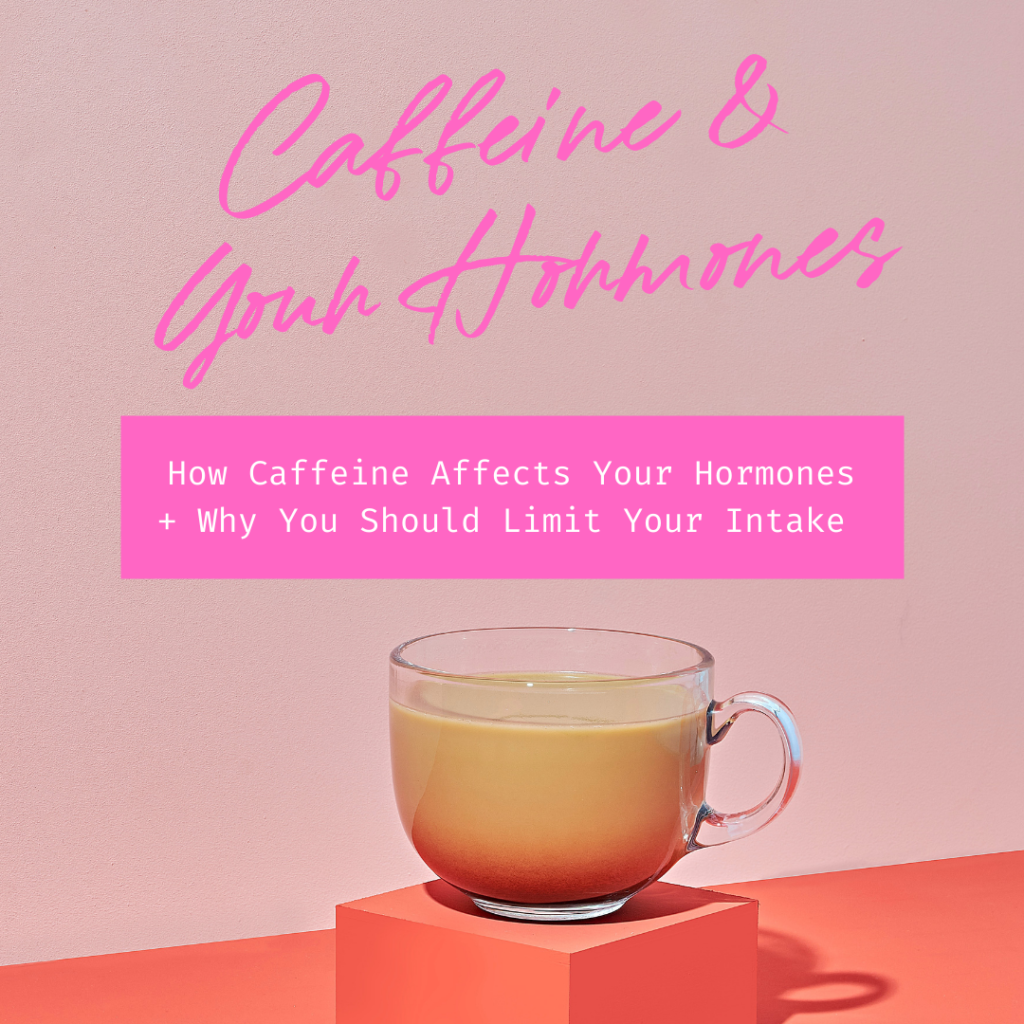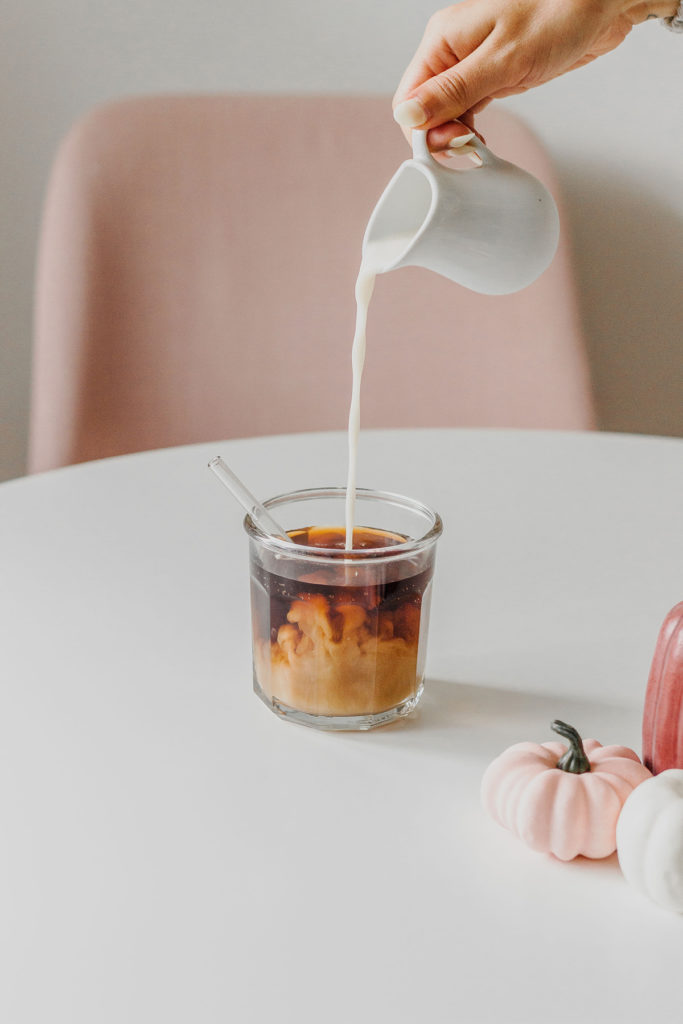I want to preface this by saying I’m a fellow coffee lover and I’m in this with you. Back in my mid-twenties nothing and no one was going to tell me to quit drinking my morning cup of joe! But i’ve learned some things since then, and I now know how to modify my caffeine intake so I can still enjoy the occasional cup without throwing my hormones completely out of whack.

Let’s start by taking a look at the facts of how caffeine affects your hormones:
- Caffein can lead to the development of breast and ovarian cysts (especially in women with PCOS, fibroids, endometriosis, ovarian cysts, or fibrocystic breasts)
- Caffeine increases cortisol levels and stresses the adrenals, interfering with ovulation
- Caffeine depletes key vitamins and minerals necessary for ovulation, healthy fertility and hormone balance
- Caffeine can increase cramping during PMS and menstruation
- Caffeine can increase anxiety and negatively affect blood sugar levels
Yikes — Not cool caffeine, not cool!
But before we go into full panic mode, I want to remind you that, as with anything, balance and moderation is key here. So those who drink coffee a few times a week or only socially are a lot better off than those drinking 2, 3, 4 (or more!) cups per day.
One of the biggest things that influences how caffeine affects each individual woman is our genes. Your genes affect your ability to metabolize caffeine safely. This is why some people can drink two cups before bed and sleep like a rock, while others will be up all night. Research shows that the same gene (CYP1A2) that is involved in metabolizing caffeine is also involved in metabolizing estrogen. So if you’re a slow caffeine metabolizer, you’re probably also a slow estrogen metabolizer. This causes your liver to have to work extra hard and use more of your micronutrient stores to eliminate the caffeine, and there may not be enough micronutrient reserves left over to flush out the excess estrogen.

Caffeine also affects how your body responds to insulin (the hormone that allows sugar to enter your cells to be used for energy). Caffeine can raise blood sugar and insulin levels, especially for those with type 2 diabetes. Caffeine can also lower your insulin sensitivity. This means that your cells don’t respond to insulin as much as they used to. causing your body to have to continually produce more insulin to get the cells to respond.
So how can you enjoy your coffee once in awhile and still keep your hormones in balance?
- If you’re drinking caffeine daily, work to slowly reduce your coffee intake to 1 cup a day (Ideally working towards drinking it only a few times a week).
- If you’re only in the coffee game for the energy boost, try switching to green tea which has less caffeine than coffee and also contains antioxidants.
- If you’re in it for the taste and ritual (like me!), try switching to decaf coffee (be sure to go organic and only purchase brands that use the Swiss Water Process to decaffeinate the beans — Check out my Favorites Page for my fave decaf coffee brand!) OR try Dandy Blend Coffee Alternative.
- Avoid dairy creamers and fake creamers such as Coffee Mate, and instead opt for sugar-free, dairy-free creamers like oat milk, almond milk or coconut milk (See my Favorites Page for my fave dairy-free creamer!)
- ALWAYS have a healthy well-balanced meal prior to drinking any coffee — I can’t stress this one enough! DO NOT drink coffee on an empty stomach. Include a serving of protein and healthy fat to help stabilize blood sugar levels. This will help reduce jitters and energy dips + keep blood sugar stabilized.
- Keep up on taking your high quality multivitamin (I love Designs for Health Prenatal Pro — Contact me for details on how to purchase!)
- Cut the sugar out of your coffee – If you get jittery, anxious or feel your blood sugar dip from just coffee, the sugar will make this worse.
- If you experience cramps and/or anxiety during PMS or your period, avoid caffeine during this time!
- If you are in a season of high stress, you need to avoid caffeine for now so you can heal your adrenals.
The bottom line is we don’t need to fully eliminate coffee and caffeine, but being aware of the affects it has on your hormones and your body will help you to feel empowered to make the best choices for YOU!
References
Brighten, J., 2019. Beyond the pill. New York: HarperCollins Publishers.
Murray, M. and Pizzorno, J., 2012. The Encyclopedia of Natural Medicine. Atria Books.
Vitti, A., 2020. In the Flo. New York: HarperCollins Publishers.
[…] Caffeine — You can read more about how caffeine affects your hormones in my previous blog post, Caffeine & Your Hormones […]
[…] Caffeine & Your Hormones | soulspirednutrition.com […]
[…] Caffeine & Your Hormones | soulspirednutrition.com […]
[…] Caffeine & Your Hormones | soulspirednutrition.com […]
[…] Caffeine & Your Hormones | soulspirednutrition.com […]
[…] Caffeine & Your Hormones | soulspirednutrition.com […]